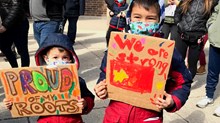Are We Wasting the Anointing of God? Let’s Pursue Peace, Even Online.

It is “good and pleasant… when God’s people live together in unity” (Ps. 133:1), so what is it when Christian siblings attack each other? If unity is “precious oil” (Ps. 133:2) which anoints the head of Aaron, the “dew of Hermon” which showcases God’s “blessing, even life forevermore” (Ps. 133:3), what is the strife and discord we so often see in the modern church?
I don’t think it is an exaggeration to say that it is the tears of Jesus in the garden, the condemnation of sin which is death.
As we look specifically at the digital spaces that we inhabit, places so often full of sniping, disdain, and even physical threats, it truly does beg the question, “Can we even have civil discourse when interacting online? Is every conversation doomed to de-evolve into bitterness and miscommunication?”
Again, I don’t think it is an exaggeration to say that even in the wilderness of the internet—because of the tears of Jesus in the garden—real, valuable, and lasting communion is possible, the joy of fellowship which is life.
How then, do we pursue this? When the shootings in Atlanta happened in the spring of 2021, this violent hate crime confirmed what many in the Asian American community already knew to be true: bigotry and rage against Asians is still alive and well. As a multiethnic woman of white and Asian descent—one who presents as mostly white—I was surprised at how much the shootings affected me. Perhaps it was because I lived in Atlanta for a decade, because I knew that area of town and had spent much time there eating, singing karaoke, and eating even more. Perhaps I felt the shootings so viscerally because I still had many Asian American friends in Atlanta, and I worried for their safety.
Perhaps I felt the grief and rage so keenly because Christian siblings, many of whom are Black, checked in on me and gave me “permission” to feel those things. Some of the direct messages, texts, and gifts came from my analog, “real life” friends. But many of them also came from my digital friends—folks I’d connected with on Twitter, Facebook, and other online spaces. And as I wept and cried out to the Lord, I felt it. I felt the oil of anointing winding its way down my head, twining with my tears, running over my collar. I felt the support and anointing of the community of the Lord.
A few voices intruded, loud clanging symbols which threatened to distract me from my holy space of grieving and being grieved with. But as I listened to the voice of God, made manifest in the voice of my Christian siblings, I heard the voice of Jesus. I saw him weeping at the tomb of Lazarus and over Jerusalem. I saw his angry, holy tears as he cleansed the temple of those who kept away the marginalized. I watched him sweat blood in the garden.
I remembered that a tiny, lisping Jesus was once blessed by wise ones from the East, those who brought him oils of anointing for both his life and his death.
One of the many remarkable aspects of Jesus is that not only is he God and human, he is ethnically mixed. He walked the sands of the Middle East and North Africa, the fulfillment of the dreams and longings of his ancestors—foreparents who were not just of Jewish ethnicity, but also Canaanite, Moabite, and Hittite heritage (see Matthew 1).
That is part of his uniquely far-reaching compassion: Jesus has love for the Nations not just built into his heart, but actually running through his veins. Jesus was—and somehow still is—one of the marginalized, one of the powerful but quiet voices who brought about lasting change.
Jesus is the oil of anointing.
And it is the Holy Spirit of Jesus which flows over and around and in us, allowing us to reach across many a digital divide and bring words which El Roi, the God who sees, has uttered time and again to his people: “I am here with you. I weep with you. I see you.”
We find our footing to remain civil when we remember that truth—that God sees us—not in a creepy Santa Claus way, but in a way which remembers that “every square inch” (as Kuyper said) belongs to the Lord, and that his people are called to bring words of healing and redemption to the world. As an author of a book about the goodness of mixed ethnicity, one of the most powerful and encouraging privileges is to hear from so many “I felt seen,” as they read other multiethnic folks’ stories and explored the joy of the significance of Jesus’ mixed ethnicity.
Even (especially!) when we disagree with other believers online, it is imperative that we rely on the Holy Spirit to guide our interactions. When I asked questions about the fairly new phrase “BIPOC” and offered some pushback on Twitter, I was so encouraged by my interactions on that platform. Many people of color weighed in on the importance of the idea of “Black, Indigenous, (and) People of Color” as an overarching label which honored the ways in which Black and Brown people of color face a very specific and dangerous type of prejudice in this country.
And when I suggested an alternative—the acronym BILAM+ (Black, Indigenous, Latino, Asian, Mixed, plus”—though many folks disagreed, they did so with Christlike patience and humility. These (mostly monoethnic folks) were living into the precious promise and reality that our mixed-ethnicity Christ has secured for us by his sacrifice: we need not choose justice over kindness, nor civility over action.
No, the Gospel tells us, we choose to follow the Triune God who leads us to do justice with mercy and humility. We wrap ourselves securely in the cloak of Christ, who equips, empowers, and encourages us to pursue civility as we take action. We look to our siblings, and together we live in a unity which does not always agree on the finer points of orthodoxy and orthopraxy, but always agrees on one thing:
God brings life out of death and anoints his people to conduct ourselves—in both digital and in-person spaces—as his agents of life, peace, and a unity that overflows our own collars and brings healing to the heads of others.
Chandra Crane (MA, Reformed Theological Seminary) is the mixed ministry coordinator for the multiethnic initiatives department of InterVarsity Christian Fellowship and author of the book Mixed Blessing: Embracing the Fullness of Your Multiethnic Identity. Growing up in a multiethnic/multicultural family in the Southwest and now happily transplanted to the Deep South, Chandra is passionate about diversity and family and is a member of the multiethnic Redeemer Church in Jackson, Mississippi.
The Better Samaritan is a part of CT's
Blog Forum. Support the work of CT.
Subscribe and get one year free.
The views of the blogger do not necessarily reflect those of Christianity Today.






















